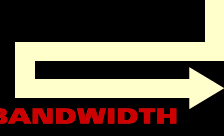 |
||||
 |
||||
|
In the networked society the kind of bandwidth of your connection will determine
whether you're in the game or out. It's not just about being flushed by
the data-pipes, it's about setting your
own trash against the data-stream.
It's about the vision of wired citizens as passive consumers of virtual
corporate waste, versus the active prosumer, the critical consumer and
producer of digitised content. There are still a lot of questions to be r esolved. First of all, who will own the backbones of the digital freeways of the mind, and will we have enough space to cast our own content on its tracks? What effect will the virtual monopolies have on the equal share in the data drive for everyone who cares enough to bother about it. On the other hand we might be just a reactionary phantom from a technologically outdated past, and soon we might be flooded by bit bearing media. So what are we going to do with unlimited bandwi dth? Is the fetish phantasy of full feed, full speed communication just another screen on which to project the utopia of an universal understanding between people? If everybody is a broadcaster, who wil l shut up and listen?
|
||||
  |
||||